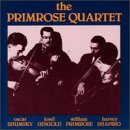| All Artists: Haydn, Schumann, Brahms, Primrose Quartet Title: Great Recordings Members Wishing: 0 Total Copies: 0 Label: Biddulph Records Release Date: 4/19/1993 Genre: Classical Styles: Chamber Music, Historical Periods, Classical (c.1770-1830) Number of Discs: 2 SwapaCD Credits: 2 UPC: 744718005321 |
Search - Haydn, Schumann, Brahms :: Great Recordings
CD Details |
CD ReviewsHistorical recordings, "Heifetzian" interpretations Discophage | France | 10/06/2006 (4 out of 5 stars) "In 1938, at the instigation of the National Broadcasting Corporation of New York, four members of Toscanini's famous orchestra gathered to form a string quartet which took the name of its viola player, the famous William Primrose. In 1940 and 1941 they made a series of 78rpm recordings for RCA, including the first recording ever of Haydn's "Seven Last Words of Christ on the Cross" and a recording of Brahms' 3rd quartet which (for reasons unexplained) was not released, but the enterprise came to an end when the United States entered the war, and the rise of the LP in the early 50s gave it the final blow by sending even the memory of the Primrose Quartet to oblivion. It is these complete recordings that Biddulph has given back to us, half a century later. The interpretations can be called "Heifetzian", as their style anticipates the famous series of chamber music recordings that Heifetz made for RCA in the 50s and early 60s, often featuring dry acoustics and whipped-up tempos, but also, at their best, a fiery passion. And in view thereof, it doesn't come as a surprise that Heifetz would have chosen precisely Primrose as one of his favorite partners.
Indeed, with the Primrose Quartet and 1st fiddler Oscar Shumsky (himself a great soloist in his own right), tempos are generally brisk, oftentimes the fastest of all comparative versions, except for some very deliberately paced slow movements (Smetana); the recording is dry and with no bloom, and it sounds indeed like transfers from 78rmps, with surface noise and boxy sound. But one adjusts. In Brahms' 3rd quartet, with that approach, it is the 1st movement, of Haydnesque verve and with a jaunty second theme (1:05) that is the most likely to surprise our habits and expectations, more accustomed to more spacious readings - but Brahms did write "vivace", and so it is. The andante is superbly restrained, and portamento, when it is exercised with as much taste and discretion as by Oscar Shumsky, and with such a sense of singing, is heart-rending; my only quip in this movement has to do with the phrasing in the middle section that is too legato to fully express the dramatic violence of the passage. The scherzo has all the requisite agitation, with a superb attention to nuance and dynamics, and the finale with variations is again very brisk and full of verve. The Smetana quartet follows the same interpretive options, with an allegro a bit dry but of awesome virtuosity and moving lyricism, a lively polka with fine nuances in its middle section, a largo sostenuto very deliberately paced and of harrowing tension, and a finale of irresistible verve. In Schumann's piano quintet the foursome are joined by Jesus-Maria Sanroma, another future partner of Heifetz. The opening Allegro is brisk, and though the Primrose Quartet members do not always heed the very precise tempo changes written by Schumann, their slowdown for the second theme is discreet enough not to stint the sense of forward momentum. The funeral march doesn't linger but unity of tempo in the movement's three sections is more or less observed (Schumann doesn't write any tempo change, though most ensemble apply some), although the second motive, a long lyrical lament, could have been taken a bit more slow, scherzo and finale display an invigorating vitality. This double-album ends with a lagniappe, a track 11 on the 2nd CD that is announced neither on the CD itself nor on the liner notes or back card: 3 minutes of a little scherzo of mendelssohnian nimbleness - the 3rd movement "Allegro vivo e scherzando" from Tchaikovsky's 3rd quartet. The 78rmp era was fond of those little trifles, but what we have is enough to make one regret that the ensemble didn't record the complete quartet. Interesting historical documents, and some fine if controversial music-making. " |

